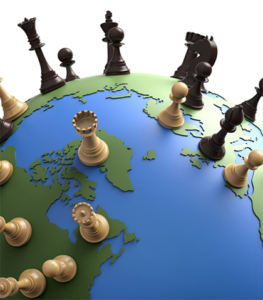Global trends in geopolitics, migration and economics
The Washington-based Pew Research Center has identified some critical trends in global public opinion that could ha ve significant impacts on global diplomacy, migration and the potential for conflict over the coming decade.
ve significant impacts on global diplomacy, migration and the potential for conflict over the coming decade.
Pew researchers have surveyed more than half a million people in 64 countries on their views about international and domestic politics, economics and other hot button issues.
They have identified five key trends that could influence the way global politics is conducted and thus the lives of millions of people.
And the results give a fascinating insight into the allegiances, social and political perceptions as well as the geopolitical circumstances of the populations of the nations surveyed.
Firstly, the surveys found that more than half of the public in all 27 countries surveyed in 2018 say trade is a good thing for their nation.
This holds true for advanced and emerging economies alike, the surveys found.
“The share of adults who say trade is a good thing ranges from a high of 93 per cent in the Netherlands, Spain and Sweden to a low of 54 per cent in Argentina,” the Pew report said.
“In the United States, where President Donald Trump has been renegotiating US trade agreements with other countries, 74 per cent of adults say trade is a good thing for the nation,” it said.
The surveys also found that while most see trade positively in principle, far fewer believe that increased trade will bring specific benefits, such as more jobs, higher wages or lower prices.
“People in advanced economies are especially sceptical of the role of trade in boosting wages: A median of just 31 per cent across 18 advanced economies believes this is the case, compared with 47 per cent across nine emerging economies,” the Pew report said.
Secondly, the surveys found that pessimism about the financial prospects of the next generation is prevalent in most economically advanced economies.
Eight-in-ten French adults say children in their country will be worse off financially than their parents when they grow up, the highest share in any nation surveyed by the Center in 2018.
Large majorities share this view in Japan (76 per cent), Spain (72 per cent), the United Kingdom (70 per cent), Canada (67 per cent) and Australia (64 per cent).
Poland is the only advanced economy in the survey where a clear majority of adults (59 per cent) say children in their nation will be better off financially than their parents when they grow up, the surveys found.
Thirdly, in many countries, fewer people today than previously believe the US takes other nations’ interests into account when making international policy decisions, the Pew Surveys found.
“As of 2018, only about one-in-five Germans say this, down from 50 per cent five years earlier. There were also large decreases in South Africa (a 23 percentage point decrease since 2013), Brazil (down 22 points), Mexico (19 points), France (17 points), Kenya and Italy (both 16 points),” the Pew report said.
In some countries, however, people have become more likely to say the US takes other nations’ interests into account when it makes foreign policy decisions.
In Israel, for example, where President Trump has decided to move his nation’s embassy to Jerusalem in the face of protests from Arab countries, 86 per cent of adults say this, up from 69 per cent in 2013.
Fourthly, Russia’s standing among Europeans has slipped, the Pew surveys show.
“Views of Russia were at their most positive in several European countries in 2011, but they have fallen since then and have remained consistently low over the past few years,” the Pew report said.
“Between 2011 and 2018, the share of people with a favourable opinion of Russia declined by double digits in France, Germany, Poland, Spain and the UK.
“The biggest drop occurred in the UK, where just 22 per cent of the public now sees Russia favourably, down from 50 per cent in 2011.
“As of 2018, no more than 35% of the public in any of these five countries holds a favourable view of Russia,” the report said.
While attitudes toward Russia tend to be negative in Europe, many people in the region simultaneously see Russia playing a more important role on the world stage compared with a decade ago, the surveys show.
“Around half of adults in France (51 per cent) and the UK (48 per cent) say this – far more than the share in each country who say Russia is playing a less important global role than a decade ago,” the Pew report said.
Lastly, the Pew surveys found that people across the globe are divided about whether the US or China is the world’s leading economic power.
“Across 25 countries surveyed by the Center in 2018, a median of 39 per cent point to the United States as the world’s top economy, while a median of 34 per cent pick China,” the Pew report said.
“But there are wide differences in these views by country. In Germany, just 19 per cent of adults say the US is the world’s leading economy, while 53 per cent point to China. In South Korea, by contrast, 67 per cent of adults see the US as the world’s top economy and just a quarter name China,” it said.
But far more people globally cite the US over China when asked which country they prefer to be the world’s leading power: A 25-country median of 63 per cent preferred the US compared with just 19 per cent who preferred China.
At the same time, far more people believe China’s role is on the rise than say the same about the US.
To read more of the Pew Center research, go to: https://www.pewresearch.org/fact-tank/2019/04/25/trends-in-international-public-opinion-from-our-global-indicators-database/?utm_source=Pew+Research+Center&utm_campaign=395ed87020-EMAIL_CAMPAIGN_2019_04_25_06_26&utm_medium=email&utm_term=0_3e953b9b70-395ed87020-400311237
Laurie Nowell
AMES Australia Senior Journalist












